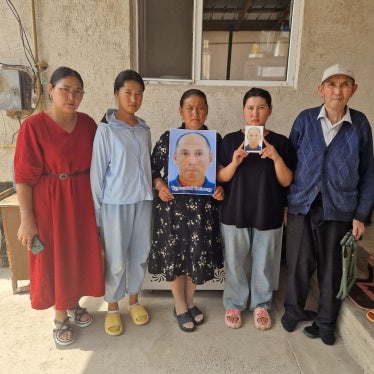(Beirut) – Algerian authorities should immediately release two men arrested on April 16, 2014, for peacefully protesting and drop charges against them. The men were arrested at the Central University in Algiers during a protest organized by the Barakat (Enough) movement, which advocates term limits and opposes a fourth term for President Abdelaziz Bouteflika. The president won reelection on April 17.
On April 20, Mohand Kadi, a youth activist, and Moez Bennecir, a Tunisian national living in Algeria, were charged with participating in an “unlawful non-armed gathering harming public order,” under articles 97 and 98 of the Algerian penal code, which carries a punishment of up to a year in prison.
“Time and again, Algerian authorities are using repressive laws to prosecute those who simply express peaceful dissent,” said Eric Goldstein, deputy Middle East and North Africa director at Human Rights Watch. “Officials have been targeting and harassing democracy advocates affiliated with the Barakat movement.”
The men have been kept in pretrial detention since their arrest. A first instance tribunal in Algiers is to decide on May 4 whether to release them pending trial, their lawyer, Noureddine Benisaad, told Human Rights Watch.
The Algerian government should promptly rescind the 2001 blanket ban on protests in Algiers and amend the 1991 Law on Public Meetings and Demonstrations and the criminal code to conform to international human rights standards, Human Rights Watch said. The changes should eliminate any possibility of criminal charges for participating in peaceful gatherings.
In recent years, Algerian authorities have frequently repressed peaceful protests, using preemptive techniques, including arresting organizers in advance and blocking access to demonstration sites. Several human rights activists and union leaders have faced charges related to the peaceful exercise of their right to assemble or their expressions of support for strikes and demonstrations.
During the presidential campaign, except for a short lull between March 15 and April 16, authorities routinely forcibly dispersed protesters opposing Bouteflika’s fourth term, especially Barakat members. Officials arrested hundreds of people in Algiers, detaining them for hours in police stations. Security forces arrested Barakat supporters at protests on at least three occasions in March.
An official of a government-appointed commission was quoted in an interview published on April 23 in the independent newspaper Ennahar as saying Barakat activists should be charged and prosecuted for defamation, disrupting the public order, and attempting to destabilize the state, because of their protests throughout the country. The official, Farouk Ksentini, president of the National Consultative Commission for the Promotion and Protection of Human Rights, called Barakat members “foreign agents” and said their slogans against the president’s fourth term were illegal because the Algerian Constitution does allow the incumbent president to seek new terms.
The Algerian criminal code contains various articles that could lead to prosecution and imprisonment for exercising the rights to freedom of assembly or speech. Article 96 states that anyone who distributes, sells, or exhibits leaflets harmful to the public interest could face a prison sentence of up to three years and a fine of up to 36,000 Algerian dinars (US$458). Article 97 prohibits unarmed gatherings of a nature that disturb the public peace, and article 98 punishes with a prison term of up to one year anyone who participates in such a gathering.
Parliament in 1989 enacted Law 89-28 Governing Public Meetings and Demonstrations, which was amended in 1991 to significantly reduce the right to assemble and to hold meetings.
Under the law, a group planning a public gathering must seek authorization from the governor three days in advance. The law defines public demonstrations as “processions, parades or gatherings of people and, generally, all exhibitions on public roads” and says organizers must request an authorization from the governor at least eight days in advance. The governor is supposed to give his written authorization or refusal at least five days before the demonstration date, and deliver a receipt immediately when the request is made. However, the administration has often failed to provide the receipt, leaving organizers unable to prove they submitted their request in time.
The law also provides for a prison sentence of up to one year and a fine of 15,000 dinars ($191) for those who participate in an illegal gathering.
Authorities imposed the ban on all demonstrations in Algiers on June 18, 2001, four days after a huge march in Algiers for the rights of the Amazigh, or Berber, ethnic group. The protest drew participants from all over the Amazigh-majority Kabylia region and resulted in some looting of shops and clashes involving the police, demonstrators, and local youths. Authorities did not rescind the ban in 2011, when they lifted the 19-year state of emergency.





